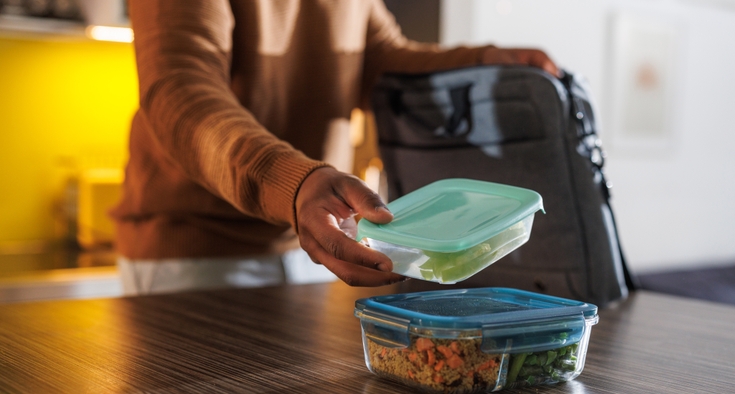Interest in raw milk – milk that has not been pasteurized to kill germs – has been increasing among U.S. consumers due to wellness influencers touting its purported benefits. Its sale is not legal in many states due to potential health risks.
But even where the law prohibits its sale, it’s being sold and making some people ill, according to the U.S. Food and Drug Administration. Even as cases of bird flu were being documented in cattle across the U.S. this year, weekly sales of raw milk had spiked compared to a year earlier, market research firm NielsenIQ reports.

Drinking raw milk has no documented added health benefits compared with milk that has been pasteurized, and has added risks, said Dr. Amra Zuzo, a pediatrician at Novant Health Pediatrics Berewick in Charlotte. What’s more – harmful bacteria such as E. coli, listeria and salmonella that can be found in unpasteurized milk can be especially dangerous for children under age 5, any child born prematurely or those with other conditions that impact the immune system, she said. She shared the latest insights on the raw milk trend.
Your child deserves the best care.
What is raw milk and why is it popular?
Raw milk is dairy milk from a cow, a goat, or other animal that is not pasteurized. Milk started being pasteurized in the 1900s to prevent illnesses that commonly occurred after consuming raw milk. Pasteurizing involves heating the milk to a certain temperature for a certain amount of time to remove all germs, including E. coli, listeria, salmonella and other bugs that can cause significant illnesses, especially in children under 5 and adults over 65.
Raw milk is a hot topic across news and social platforms these days, driven in part by the support of Robert F. Kennedy, Jr., President-elect Donald Trump’s nominee for secretary of health and human services.
In some cases, supporters say drinking raw milk instead of pasteurized can benefit digestion and the body’s immune system. There is no scientific evidence to back those assertions.
In fact, we can reap those benefits without risking illnesses that raw milk can cause.
Why is it especially risky to give raw milk to children?
Children’s immune systems operate differently from those of healthy adults. Their immune systems are still developing and are particularly susceptible to some types of infections. Often, they develop more serious illness after being exposed to certain germs compared to older children and adults. When a child gets sick from bacteria found in unpasteurized milk, such as E. coli or listeria, the illness can include vomiting, fever and diarrhea. It can spread quickly, and your child can get really sick. Young kids can even develop a blood infection called sepsis that goes throughout their whole body, including their brain and their heart. The complications of a bacterial infection can be liver failure, kidney failure, paralysis or even death. I personally would not recommend it for any child, or even an adult. It's not necessary, because the side effects are not worth the risk, and there are no added benefits of drinking raw milk as opposed to pasteurized milk.
Best doctors. Amazing nurses. Remarkable care.
Click here to read more about our expert children's health care.
What are some myths about raw milk?
There is a lot of misinformation online. Some people are under the impression that raw milk is easier for people who are lactose intolerant to digest, and that simply is not true. Raw milk does contain lactose, so it will cause the same reaction in lactose-intolerant people as typical pasteurized milk.
Another myth is that raw milk has antibodies to help a child’s immune system that pasteurized milk does not have. This is also untrue. The best antibodies are actually in breast milk, which we recommend until age two, if at all possible. If breast milk is not available for the full two years, parents can talk with their child’s pediatrician about formula if the child is under 12 months. Once they reach 12 months, parents can wean their child off formula and onto pasteurized whole cow’s milk.
Some parents are led to raw milk because of myths about it being easier to digest. If their child can’t tolerate cow’s milk, what alternatives could they try?
The protein, fat and other nutrients in milk are a super important building block for your child to growth healthy and strong, supporting their bone mineralization and brain development, making milk an important part of their diet.
If traditional cow’s milk is not working – for example, the child gets gassy, uncomfortable or constipated with pasteurized cow’s milk, we always recommend they try lactose-free whole cow’s milk.
If that still is not their preference, there are some plant-based milks that are available. Some of them come close enough to having enough protein and fat for brain development for children from the time they’re 12 months to around age 2. One of those plant-based products is yellow pea milk. That has been quite successful for families who choose not to give their children cow’s milk.
I would not recommend almond milk unless your child eats significant amounts of other sources of dairy, such as yogurt or cheese, between the ages of 1 to 2 years. Almond milk generally doesn't have quite enough fat or protein for kids’ brain development and overall development to age 2 years old. Once a child is 2 years old, they don’t need as much protein and fat in their milk source. So after the age 2 years old, any milk is fine.
Having said all of this, we do have families who prefer almond milk for everybody in the house. So children can start that at 12 months and so long as the child has other sources of protein, fat and calcium in their diet from foods like cheese, yogurt and cottage cheese, they will get the nutrients they need for development.
Is there a difference in feeding your child farm-fresh pasteurized cow’s milk as opposed to store-bought pasteurized milk?
I have worked with several families who obtain their milk from local farms that indicate that they have met safety certifications and pasteurize their milk for sale to the public. Having said that, I've had several families who ended up having salmonella from some of those sources.
So if parents choose to get their fresh fruits and vegetables and their organic pasteurized milk from a local-source farm, that is fine. However, I would make sure they do extra research to make sure the farm is certified as it should be, meaning they are following pasteurization procedures and are subject to regular inspections. A majority of families tell me the owner of the farm they buy from says the farm is certified. Very few of us go the extra mile to check that certification, but it’s important to your child’s health to take that extra precaution.
Where should parents with questions about milk go for fact-checked information?
A trusted pediatrician is the best place for families to take any questions about milk or other nutritional needs. It’s very important that we discuss what milk source we are using for your child. We welcome any questions, because we want your child to get the utmost benefit from their diet to help them develop normally in the first couple of years of life.
We have overwhelming scientific evidence to show the nutrition in the first five years of life is super important, and we can build your child's brain in these years. So if you have concerns, please talk to us about it. We can always find options to work for whatever needs or preferences the child has.











